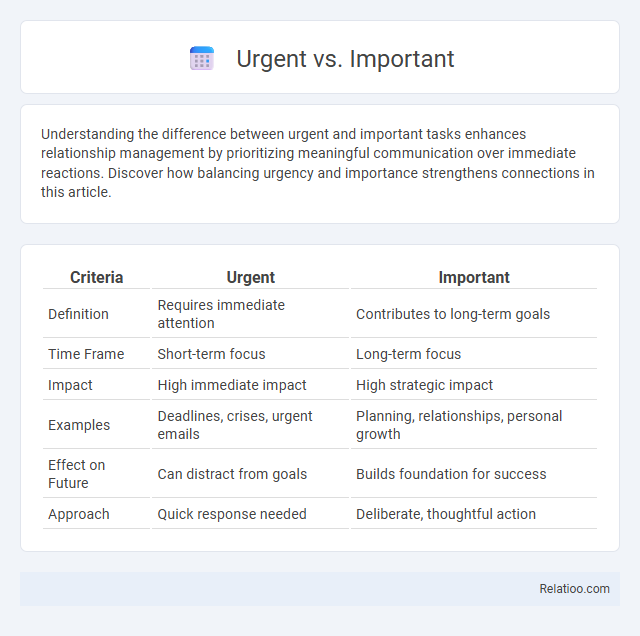Understanding the difference between urgent and important tasks enhances relationship management by prioritizing meaningful communication over immediate reactions. Discover how balancing urgency and importance strengthens connections in this article.
Table of Comparison
| Criteria | Urgent | Important |
|---|---|---|
| Definition | Requires immediate attention | Contributes to long-term goals |
| Time Frame | Short-term focus | Long-term focus |
| Impact | High immediate impact | High strategic impact |
| Examples | Deadlines, crises, urgent emails | Planning, relationships, personal growth |
| Effect on Future | Can distract from goals | Builds foundation for success |
| Approach | Quick response needed | Deliberate, thoughtful action |
Understanding the Difference: Urgent vs Important
Understanding the difference between urgent and important tasks is crucial for effective time management, as urgent tasks demand immediate attention while important tasks contribute significantly to your long-term goals. Prioritizing urgent tasks often leads to reactive work habits, whereas focusing on important tasks enables strategic planning and productivity growth. You can enhance your efficiency by identifying and balancing these two distinct categories to make more informed decisions about how to allocate your time and energy.
The Eisenhower Matrix: Prioritizing Tasks Effectively
The Eisenhower Matrix categorizes tasks into four quadrants based on urgency and importance, helping you prioritize effectively and focus on what truly matters. Tasks deemed urgent and important require immediate attention, while important but not urgent tasks benefit from strategic planning to prevent future crises. Mastering this time management tool improves productivity by enabling clear decision-making and reducing stress from last-minute deadlines.
Why We Confuse Urgent with Important
People often confuse urgent tasks with important ones because urgent tasks demand immediate attention, triggering a sense of pressure and priority in Your mind. This confusion arises from the brain's natural response to stress and deadlines, which can overshadow long-term goals and important activities that require thoughtful planning. Understanding the difference enhances your time management skills by helping You allocate resources to truly impactful tasks rather than merely reacting to urgent distractions.
Consequences of Prioritizing Urgency Over Importance
Prioritizing urgency over importance leads to constant firefighting, resulting in decreased productivity and burnout due to neglect of long-term goals. Critical tasks that drive significant outcomes are often postponed, causing missed opportunities and strategic setbacks. Effective time management requires balancing urgent demands with important responsibilities to ensure sustainable success and goal achievement.
Strategies to Distinguish Urgent and Important Tasks
Effective strategies to distinguish urgent and important tasks involve prioritizing based on impact and deadlines, using frameworks like the Eisenhower Matrix to categorize activities into four quadrants. Urgent tasks demand immediate attention due to time sensitivity, while important tasks contribute significantly to long-term goals and values, requiring strategic focus. Implementing time-blocking techniques and regularly reviewing task lists helps prevent urgent tasks from overshadowing important objectives, ensuring balanced time management and productivity.
Time Management Techniques to Balance Both
Effective time management techniques, such as the Eisenhower Matrix, help you prioritize urgent and important tasks by categorizing activities based on their significance and deadline. Techniques like time blocking and the Pomodoro Technique optimize focus and reduce procrastination, ensuring balanced attention to both urgent demands and long-term goals. Mastering these strategies enhances productivity, minimizes stress, and improves your ability to allocate resources efficiently across diverse responsibilities.
Real-Life Examples: Urgent vs Important
Distinguishing between urgent and important tasks is critical for effective time management, as urgent tasks demand immediate attention but may not contribute to long-term goals, while important tasks align with priorities and strategic objectives. For example, answering an unexpected work email (urgent) can interrupt deep project work that drives career advancement (important). Effective time management involves prioritizing important tasks to maximize productivity and reduce stress caused by constant urgent demands.
How to Say No to Urgent But Unimportant Requests
Saying no to urgent but unimportant requests requires clear prioritization of tasks based on their true impact on goals and deadlines. Use assertive communication to explain current commitments and suggest alternative solutions or time frames for less critical tasks. Maintaining boundaries and regularly evaluating requests against your priorities enhances effective time management and reduces distractions.
Tools and Apps for Task Prioritization
Task prioritization tools like Trello, Asana, and Todoist enable users to categorize tasks based on urgency and importance, aligning with the Eisenhower Matrix framework. These apps offer features such as customizable labels, deadlines, and reminders that enhance time management by clearly distinguishing urgent tasks from important but non-urgent ones. Integrating these tools with calendar apps and time-tracking software further optimizes productivity by streamlining task scheduling and monitoring progress.
Building Long-Term Success by Focusing on Important Tasks
Focusing on important tasks rather than urgent ones drives sustained progress and builds long-term success by addressing goals that genuinely advance your priorities. Effective time management involves prioritizing activities that yield lasting impact, minimizing distractions caused by urgent but less meaningful demands. You create a strategic advantage by consistently dedicating time to high-value tasks that align with your future objectives.

Infographic: Urgent vs Important
 relatioo.com
relatioo.com